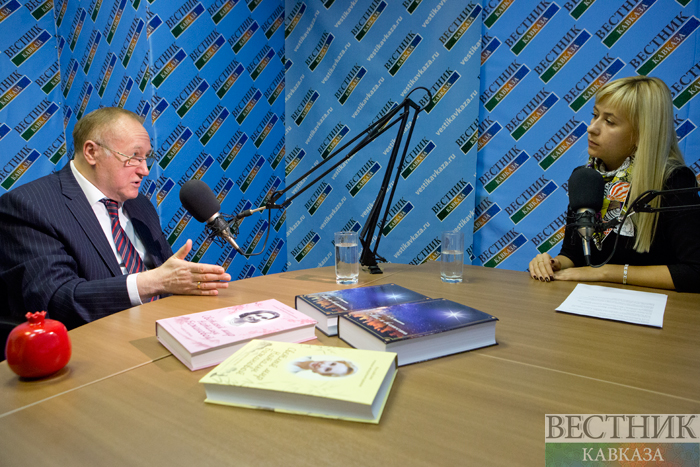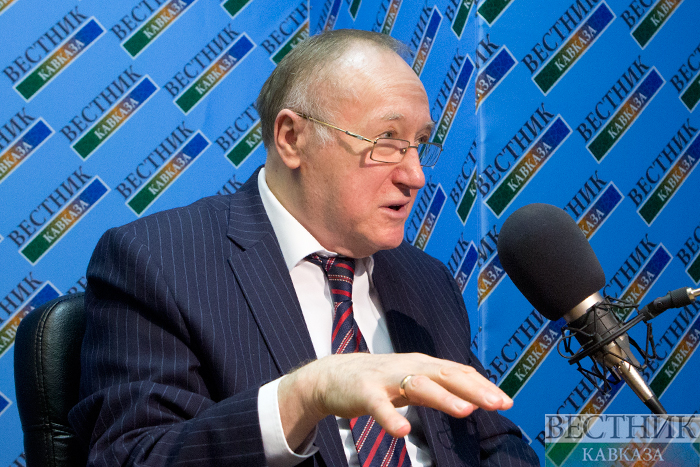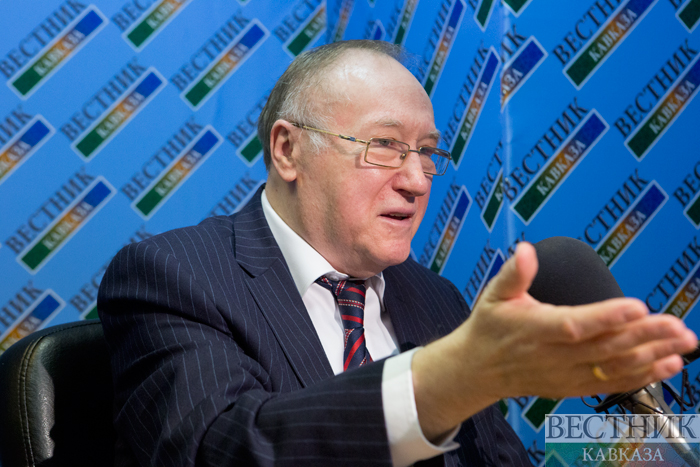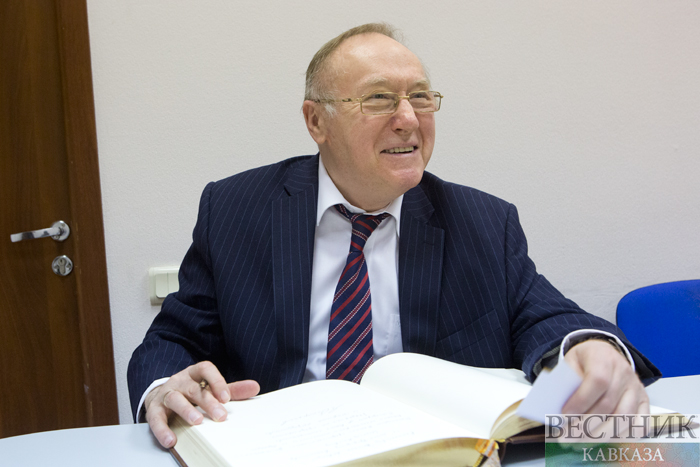Recently, the first books in a series of publications about the Russian diplomats, who have made a contribution to the study of global politics and economics, international relations, the law, civilizations and cultures, were published. Two volumes of 'The Bright World of Natalia Bazhanova' are first books in the series 'Russian Scientists in International Affairs'. Ten volumes of 'The Moment and Eternity' are also dedicated to her. A rector of the Diplomatic Academy of the Russian Foreign Ministry, Yevgeny Bazhanov, told Vestnik Kavkaza about books and about his personal experience, which he used to create them.
- What is the audience of your books? To whom do you address them?
- Firstly, to those who are interested in other countries, the issues of civilizations and cultures. For example, the chapters about the US - to Americanists or those who are interested in the US. All this was not written in scientific language, but in conversational, as they say. Secondly, to the historians. There are many historical documents. For example, the part dedicated to Korea tells a lot about the Korean War. We once released a book about the Korean War together with my wife [Natalia Bazhanova], based on the declassified documents. The war of 1950-1953 was called the most mysterious war of the 20th century. It is a mystery who and why started it and how it ended. After the collapse of the Soviet Union the archives were opened up, and we wrote this book and republished it in South Korea, Japan and the US. Now these archives are coded again, but we were able to publish our book. MGIMO Rector Anatoly Torkunov, a Korean studies specialist, also wrote a book on the basis of archives. So there are two such books. For historians it is interesting.
But 'The Moment and Eternity' is not a fully scientific book. There's a lot of correspondence between me, my wife and our relatives. But there are a lot of interesting things about the era – about what they could buy and what they could not, how they did it, how they made repairs in apartments, our perception of the US, and their perception of us.
- Where can it be found?
- Two volumes have already been published. They are sold in 'Biblio Globus', it is a partner of the Diplomatic Academy. We are actively cooperating, we have a common readers club. The books are also available in other major bookstores, and not only in Moscow. The number of printed copies of the books is only 1000, but that is no small measure these days.

- In 1970 you were a Soviet vice consul in San Francisco. Did your stay in the US was reflected in a series of books?
- Yes. Most of the book is devoted to the work in San Francisco. There is an analysis of our relations with the US, their approach to us, the analysis of the US literature, the US political system, the electoral system. There are many serious and curious things, about their relation towards the Soviet Union, about our links with business and religious and sporting organizations, with Hollywood.
There was a Soviet book store 'Knowledge' in San Francisco. The family, which owned the store had a small son. When we visited San Francisco after the collapse of the USSR, we went to the store and the boy became an adult, the owner of the store. We asked him: "Well, what's it like for Russians living in the US now?" And he says: "Those days, when you worked here, in the 1970s, we have been 'Romans' for the Americans and now we are 'Italians' for them.
- In 1976 you attended Oscars in Los Angeles, when the film Dersu Uzala won the award. How did the Soviet Union win the award for best foreign language film?
- The film was nominated, but no one knew whether it will receive the award. A Japanese film director Akira Kurosawa did not arrive to Los Angeles. But our famous Danelia arrived from Moscow as a representative of Mosfilm.
We sit there, waiting for the winner announcement. The American stars Elizabeth Taylor, Michael Devell, Nina Foch and a director Ruben Mamulyan were sitting at our table. We had drinks and Mamulyan was the most drunk. Suddenly he came on stage and said: "Gentlemen, members of the Academy, I invite you to vote for the film 'Dersu Uzala'. This is a film based on the book of the Jewish writer Arsenyev and was filmed by Jewish director".
He sat down, I said to him: "What are you talking about? What Jewish films?!" He replied: "Shut up, I know what I'm talking!" Then the final, they opened the envelope, our film won. Danelia came to the stage to receive a statuette. He did not know English, he just said, "Thank you" and left the stage. He should enter the particular door to be photographed, not into the hall. Danelia confused and got to the street. Look, he does not know English, he is holding a statuette, a little man (he is short of stature) who does not know what to do. He got to the police. We were looking for him for half a day, hardly found him at a police station. They tried to interrogate him, but could not even understand from where he came from.

- What was it like to work in the Consulate General those times?
- There was no security in our six-story building. The federal government said that the FBI has no resources to protect us. And the local authorities claimed that we are guests of the federal government, so they will not waste their money on us. Therefore, we were visited by very different people. For example, those who did not like the local mayor's work. We ask them: "Why did you come here exactly?" They answer: "If we go to another place, there will be no media, and if we are here - all the TV channels will arrive!" It was very beneficial to visit us.
Every day, a man dressed in Stalin's suit came with girls. He "took them out" of the truck, encaged and chained them.
There was extravagantly dressed lady, she wore blue trousers, a yellow jacket and a green panama. She did not know a word in Russian, but insisted that she is a daughter of the Russian Tsar Nicholas II, Anastasia, "I know that you need my father to run the Soviet Union. He is alive. He was stolen by Americans from Russia, they cut off his legs. He lives near California. I'll tell you where he is, and show you where his gold is. But you will let me to open a Chinese restaurant in Moscow. I told her: "The Soviet Government's policy is that we allow opening of only Korean restaurants." But she was visiting us and sought the opening of a Chinese restaurant for seven years, as well as performed different tasks in parallel. For example, there is an anti-Soviet demonstration, I call her: "Anastasia, disperse them!". She ran out with an umbrella and could easily disperse 100 people. We also sent her to a library. She ran back, shouting, "The FBI chased after me,look at the bullet holes," but she brought everything we requested - lists of those who perform anti-Soviet articles on radio, in newspapers, the addresses and phone numbers of those people.
A two meter tall man, dressed up as Fidel Castro, also came to us. "I am the commander of a guerrilla unit. A part of my unit is based in the Sierra Nevada Sierra Nevada mountain range, we will step on San Francisco from mountains. My fleet is in Nicaragua, it is heading San Francisco. Lay siege to the city, storm and seize power," 'Fidel' says. I ask him: "What do you want from us?" He says: "All I need is marijuana to poison America's youth and dynamite to blow up banks. When street battles begin, you should help us a little bit, your people should help us to fight".
He showed us a knife as his identity. Later, however, we complained to the FBI, and he was gone. Some time later, after the launch of the Soyuz-Apollo spacecraft, we had a reception, which was shown on TV. Later I received a letter from prison: "Supreme Revolutionary Tribunal sentenced a California Soviet consul Bazhanov to death, because he had the audacity to drink champagne instead of the traditional Russian drink vodka at the reception." And the caption: "The head of the KGB in California."
I can tell you millions of such stories. For example, there was a religious sect in San Francisco, who prayed at the portraits of our party political bureau members. They were their saints and the anthem of the Soviet Union was their religious hymn.

- Did you work in China after the US?
- After returning from the US, I studied at the Diplomatic Academy, then I was an adviser to the Soviet Embassy in China, after China I entered the Central Committee of the Communist Party of the Soviet Union to work for Mikhail Sergeyevich Gorbachev, where I was responsible for our relations with China and the Asia-Pacific region. We had terrible relations with China, we were almost enemies, and now we have become main strategic partners. There is also our contribution to it. Of course, it is not about us, but the fact is that the interests of countries have become similar. But still people did this, nothing happens automatically.
- For how long did you oversaw relations with the Asia-Pacific region in the international department of the Central Committee of the Communist Party of the Soviet Union?
- For six years. Our relations with China were developing, but at the same time the Central Committee apparatus was collapsing. When I started working there, it was prestigious, and when I was finishing, we hide the fact that we worked in the Central Committee, as it was possible to be punched in the face because of this fact. In 1991, I resigned from the Central Committee for the Diplomatic Academy, where I have been working until now. There have been a lot of travel - New Zealand, Australia, Taiwan, South Korea, Iran, Syria, Japan. In 2001, we were in Syria, and met with officials and ordinary people. It was a paradise. People lived there like a close-knit family. Religion, nationality, ethnicity had nothing to do with politics. Therefore, it pains me to see what is happening there now. We know that many problems did not exist in the Soviet Union, but they broke out when the situation has changed in the country.

- What are your impressions from Iran?
- We were in both Tehran and Isfahan. We wanted to visit Shiraz, but when we asked the Deputy Foreign Minister of Iran, why we cannot get there, he always replied: "Inshallah!". Now the Diplomatic Academy is closely cooperating with Iran. We held two joint conferences, which brought together ten specialists from Russia and ten from Iran. And both Iranists and not Iranists came from Russia and both Russianists and not Russianists came from Iran. Following the conference, we have published two books about Russia's attitude towards Iran, and about Iran's attitude towards us - the historical factor, the current situation, the perception of each other's economy, the political system.
In addition, we held a conference on the Caspian Sea status, discussed the differences in the positions of the parties. Iranian diplomats are receiving education in our academy at different courses. Recently, we received a group of five diplomats - all of them were girls. Now there is a struggle for the rights of women in the world, they have progressed in many countries - in diplomacy and other areas, particularly in South Korea.






